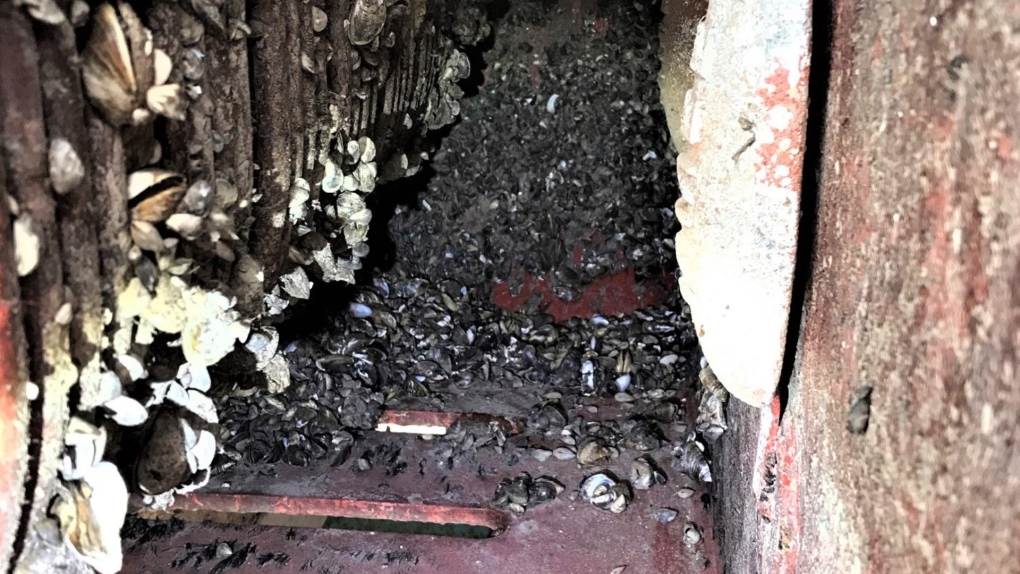Thousands of invasive zebra mussels found on barge headed for B.C. waters, province says
 Invasive zebra mussels were recently removed from a barge destined for B.C. waters. Image credit: Facebook/BC Conservation Officer Service
Invasive zebra mussels were recently removed from a barge destined for B.C. waters. Image credit: Facebook/BC Conservation Officer Service
Thousands of invasive zebra mussels have been removed from a barge that recently arrived in B.C., according to the province.
Inspectors with the BC Conservation Officer Service were called in after the provincial Mussel Defense Program was notified of a "high-risk" vessel being hauled from Ontario, the province said in a news release issued Saturday.
Zebra mussels are not native to North America and if introduced into B.C.'s waterways "pose a serious threat to B.C.’s aquatic ecosystems, salmon populations, hydro power stations and other infrastructure facilities," according to an online fact sheet published by the province.
Once inspectors located the barge – which was being transported in two pieces due to its "massive" size – it was taken to a facility in Richmond for decontamination, the province says.
"This was the largest, most significant discovery of zebra mussels on a watercraft our teams had ever experienced. To decontaminate the vessel, we required a specialized operational plan and space due to the sheer size,” said BCCOS Insp. Dave Webster in the statement.
“I am proud of how quickly our teams mobilized to stop invasive mussels from reaching B.C. waters."
Zebra mussels attach themselves to surfaces and can survive for several weeks without being immersed in water.
"Newly settled mussels are particularly difficult to detect as they are only a few millimetres in size," the government fact sheet explains.
"They multiply rapidly and are extremely difficult to eradicate once they become established in an area. In larger water bodies and complex ecosystems, they may be impossible to eradicate unless detected and contained before they become established."
The news release says that a large number of the mussels attached to the barge were viable, meaning they could have survived and multiplied once in water. The barge was quarantined for 30 days after the mussels were removed.
Some of the samples will be used to train the BCCOS' mussel-detecting dogs, German shepherds named Kilo and Major.
B.C.'s Invasive Mussel Defence Program launched in 2015. Its goal is to prevent the invasive species from being introduced in the province by inspecting watercraft, monitoring lakes, and doing outreach and education about the risk the mussels pose.
“Zebra mussels might be smaller than a fingernail, but they cause huge problems if they invade lakes and streams. Not only can they clog water pipes and ruin boat engines, they can cause significant damage to the aquatic ecosystems that sustain local plant and wildlife species,” wrote Josie Osborne, B.C.'s Minister of Land, Water and Resource Stewardship in the statement.
"This incident is a fantastic example of how co-operation and collaboration are preventing invasive mussels from taking hold in B.C. Let’s keep it this way.”
CTVNews.ca Top Stories

opinion Tom Mulcair: Prime Minister Justin Trudeau's train wreck of a final act
In his latest column for CTVNews.ca, former NDP leader and political analyst Tom Mulcair puts a spotlight on the 'spectacular failure' of Prime Minister Justin Trudeau's final act on the political stage.
B.C. mayor gets calls from across Canada about 'crazy' plan to recruit doctors
A British Columbia community's "out-of-the-box" plan to ease its family doctor shortage by hiring physicians as city employees is sparking interest from across Canada, says Colwood Mayor Doug Kobayashi.
'There’s no support': Domestic abuse survivor shares difficulties leaving her relationship
An Edmonton woman who tried to flee an abusive relationship ended up back where she started in part due to a lack of shelter space.
opinion King Charles' Christmas: Who's in and who's out this year?
Christmas 2024 is set to be a Christmas like no other for the Royal Family, says royal commentator Afua Hagan. King Charles III has initiated the most important and significant transformation of royal Christmas celebrations in decades.
Baseball Hall of Famer Rickey Henderson dead at 65, reports say
Rickey Henderson, a Baseball Hall of Famer and Major League Baseball’s all-time stolen bases leader, is dead at 65, according to multiple reports.
Arizona third-grader saves choking friend
An Arizona third-grader is being recognized by his local fire department after saving a friend from choking.
Germans mourn the 5 killed and 200 injured in the apparent attack on a Christmas market
Germans on Saturday mourned the victims of an apparent attack in which authorities say a doctor drove into a busy outdoor Christmas market, killing five people, injuring 200 others and shaking the public’s sense of security at what would otherwise be a time of joy.
Blake Lively accuses 'It Ends With Us' director Justin Baldoni of harassment and smear campaign
Blake Lively has accused her 'It Ends With Us' director and co-star Justin Baldoni of sexual harassment on the set of the movie and a subsequent effort to “destroy' her reputation in a legal complaint.
Oysters distributed in B.C., Alberta, Ontario recalled for norovirus contamination
The Canadian Food Inspection Agency has issued a recall due to possible norovirus contamination of certain oysters distributed in British Columbia, Alberta and Ontario.

































